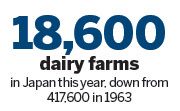Japanese shoppers suffer butter shortag
When the Japanese pose for pictures, instead of saying "Cheese!" some say "Butter!" But these days, talk of butter is more likely to bring frowns, now that rationing is an issue in their country.
As the Christmas Eve cake rush approaches, grocery stores are limiting customers to a maximum of two packages of butter each. Last week, the government announced its latest plan for "emergency imports" to ease shortages of the spread.
The butter shortfall stems from several factors, including stressed-out dairy cows, aging farmers, rising costs, and trade and price restrictions.
The official reason for short supplies of the milk used to make butter is lower output due to unusually hot weather last summer in the northern island of Hokkaido, Japan's dairy basket. Fresh milk sells for more per metric ton than butter, so dairy producers are said to be giving butter short shrift.
But the worsening shortages are also a symptom of industry protections that limit farm imports and of deeply entrenched resistance to a market-opening overhaul. Prime Minister Shinzo Abe will be struggling to deliver on reform promises even if his party wins a stronger mandate for his "Abenomics" policies in Sunday's election.
Apart from overworked cows and difficulties growing enough forage to feed them, dairying is among many Japanese agricultural industries in decline. Farmers are retiring without heirs willing to take over their farms, and prices for feed and fuel have surged, cutting into profits.

Japan had 417,600 dairy farms in 1963. As of February, it had 18,600 despite heavy government subsidies.
Japanese farmers, like those in the US and many other countries, traditionally have been protected from foreign competition, both to ensure a degree of food self-sufficiency for this resource-scarce island nation and for political reasons.
Despite Abe's vows to modernize farming and "drill deep" through the country's bedrock of bureaucracy and vested interests, his government has made little headway apart from tinkering with land reforms.
Tariffs on imports of farm produce average 23 percent. Overall, the government pays a subsidy to dairy farmers of 12.8 yen (11 US cents) per kilogram for butter and 15.41 yen per kilogram for cheese.
Dairy farmers count on the support. Japan's farm lobby remains a stronghold for the ruling Liberal Democratic Party, which, while talking up sweeping reforms, is also reassuring farmers it will continue to look after their interests.
Japan's farm protection policies are one reason the 12 nations negotiating a US-led trans-Pacific trade pact have been unable to reach an agreement.
Among the countries negotiating the trade pact, Japan has the second-largest food market after the US, and foreign dairy and other farmers are eager for more access. However, "sacred territory" issues, such as pickup trucks for the US, and beef, pork, dairy, sugar and rice in Japan, have frustrated efforts to reach an overarching agreement.
A Japanese government study estimated that opening farm markets under the trade pact could reduce domestic farm output by about 2.7 trillion yen. But a report by the US Department of Agriculture questioned that figure.
(China Daily 12/13/2014 page10)














